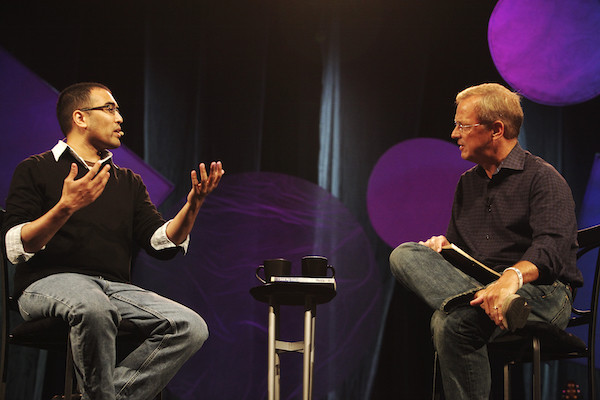An Atheist in Church? Why Christians Should Listen to Their Atheist Neighbors
by Dr. Randal Rauser
Filed under Atheism, New Atheists, The Church
A few years ago I was preparing to debate an atheist on the existence of God at my home church. One lady came up to me, curious about the posters she was seeing advertising the event, and asked about the individual I was debating. “He’s an atheist,” I explained. Immediately her expression tightened and a look of confusion came over her as if to say, “Why would you talk to an atheist?”
Forming opinions about the atheist community
To be honest, it’s not an unusual reaction. Indeed, in my experience Christians have a lot of negative assumptions about atheists. For many, the attitude is summarized in Psalm 14:1, “The fool has said in his heart, ‘there is no God’.” “You see?” the argument goes. “Atheists are fools!”
Alleged biblical proof-texts aside, the biggest catalyst for this negative perception may be the words of atheists themselves. The new atheists in particular have led the charge in ratcheting up the rhetoric and thereby deepening the divide between Christians and atheists.
Consider the case of Christopher Hitchens (d. 2011) who was widely lauded as one of the so-called Four Horsemen of the New Atheism. While Hitchens always called himself an atheist, he also frequently insisted that he is an antitheist. That is, not only did he disbelieve in God’s existence, but he insisted that he was positively against the idea of God’s existence. He didn’t want there to be a God.
For many Christians, the antitheism of Hitchens is the face of atheism. And this, in turn, allows the Christian to conclude that atheism is not so much an intellectual issue as a moral one: that is, atheists are simply in rebellion against God. And to come back to that lady’s look of confusion: why would you invite a rebel against God into church for a chat? Isn’t this tantamount to casting pearls before swine?
Unfortunately, it is common for Christians to form their opinions about the atheist community based on the declarations of some of the loudest and brashest atheists. But this is no better than atheists forming their opinions about the Christian community based on the declarations of some of the loudest and brashest Christians. (Who among us in the community of faith wants to be identified with Pat Robertson, for example?) In short, it’s simply unjustified to dismiss an entire community, Christian or atheist, based on a few loud voices.
Atheists who want there to be a God
In fact, Hitchens himself recognized that many atheists do not share his antitheistic sentiments. In his 2001 book Letters to a Young Contrarian (Basic Books, 2001), Hitchens lays out his position as follows:
“I am not even an atheist so much as I am an antitheist; I not only maintain that all religions are versions of the same untruth, but I hold that the influence of churches, and the effect of religious belief, is positively harmful. Reviewing the false claims of religion I do not wish, as some sentimental materialists affect to wish, that they were true. I do not envy believers their faith. I am relieved to think that the whole story is a sinister fairy tale; life would be miserable if what the faithful affirmed was actually the case.” (55)
Note that even as Hitchens stakes out his own antitheism, he also recognizes a type of atheist, he calls them “sentimental materialists,” who hope that God does exist and that something like Christianity is true. In other words, even if Hitchens is himself against God, he concedes that many other atheists are not.
This is significant for at least two reasons.
To begin with, the existence of so-called sentimental materialists means that Christians cannot dismiss atheism as always arising from a sinful rebellion against God. And that means that it is disingenuous at best to highlight the more provocative passages of antitheists like Hitchens as if they represented the true spirit of atheism.
This leads to a second point. What is the Christian to do with these so-called sentimental materialists? Philosophers of religion describe a non-theist who is not opposed to the idea of God as a non-resistant non-believer. I have met many non-resistant non-believers, and more than a few of these even bore that more positive disposition Hitchens describes of positively hoping that God does exist. So how should we think about these people?
Conceding the existence of non-resistant non-believers and sentimental materialists in particular presents a practical problem for the theist. In short, if there are atheists who want there to be a God, we must ask, why doesn’t God reveal himself to them? Philosophers call this the problem of divine hiddenness and they have offered several responses to address this problem. (For a brief introduction to the problem see John W. Loftus and Randal Rauser, God or Godless (Baker, 2013), chapter 20.) However we propose to address the problem, at the very least, we should concede that the existence of non-resistant non-believers makes things significantly more complicated for the Christian theist.
To sum up, not all atheists are against God, and some even hope that God does exist.
Antitheism: It’s more complicated than that
But what about those atheists like Hitchens himself who endorse explicitly antitheistic convictions? Do they really hate God? Do they embody the consummate rebel of the popular Christian conception of atheism?
Maybe. But then again, maybe not. To see why it’s more complicated than that, we can return to Hitchens’ own words. Immediately after insisting that he hopes the whole religious story is false, he goes on to explain why:
“Well, there may be people who wish to live their lives under a cradle-to-grave divine supervision; a permanent surveillance and monitoring. But I cannot imagine anything more horrible or grotesque. It would be worse, in a way, if the supervision was benign. (I have my answer ready if I turn out to be mistaken about this: at the bar of judgement I shall argue that I deserve credit for an honest conviction of unbelief and must in any case be acquitted of the charge of hypocrisy or sycophancy.”(55-56)
I agree that Hitchens’ words look bad at first blush. But a closer examination calls to mind that old saying “Tell me about the God you don’t believe in, because I probably don’t believe in him either.” And once we factor that in, things do indeed begin to look more complicated.
The first problem concerns Hitchens’ uncritical anthropomorphism. In short, he describes God as akin to a Big Brother government that is engaged in permanent surveillance of its citizenry. But this crude image fails abjectly to grapple with the concept of God in Christianity, namely as the creator and sustainer of all things who is essentially omniscient from eternity. Indeed, if you really want to get technical, in the classical theist view of God as Pure Act, his knowledge of creation derives not from external observation of creation but rather from his knowledge of his own decrees. It certainly doesn’t derive from God monitoring our ongoing activity like an eavesdropping government official. Consequently, Hitchens’ analogy is a complete and unmitigated failure.
This brings us to the second related problem concerning the divine goodness. We would all rightly be unsettled by the notion of a government monitoring our activities, not least because governments are fallible and can become corrupted and even despotic. In short, a government might use information on its citizens for nefarious ends. So it is no surprise that we cringe at the thought of living out our lives in the spotlight of a “cradle-to-grave” government supervision.
But God isn’t a fallible (still less a despotic) power. Rather, he is (to borrow a line from Anselm) that being than which none greater can be conceived. The only reason we might be unnerved at the prospect of a maximally good being observing our activity is if we are behaving in a less than maximally good way. The Christian might be inclined to assume that Hitchens doesn’t want God observing him because he wants to sin with impunity behind the back of the Anselmian deity. But the fact remains that Hitchens never seriously considers God is perfectly good in the first place.
Finally, let’s turn back to Hitchens’ parting words in which he boldly opines how he would respond to God should it happen that God does exist. As he boldly puts it, he claims that he will plead his case by noting that “at the bar of judgement I shall argue that I deserve credit for an honest conviction of unbelief and must in any case be acquitted of the charge of hypocrisy or sycophancy.”
Once again, it must be said that the conception of God that Hitchens assumes in this hypothesized interaction is such a crude caricature that he hardly seems to grasp what he is really proposing. His flippant commentary at this point strikes me as akin to a ten year old boy scout who boasts to his friends around the campfire that he would boldly chase away any grizzly bear that should happen upon their camp. If an 800 lb bear did find its way into the camp, we can predict that a confrontation would be the last thing on that little boy’s mind. In short, that boy never seriously considered what he was proposing.
It seems to me that Hitchens is like that boy in that he is utterly failing to grapple seriously with the scenario he is proposing. This fact complicates things somewhat. You see, when a person doesn’t understand the significance of what they are proposing, we tend not to hold them to the commitment in the same way we would if they did fully understand that significance. For example, let’s say that I ask my friend Don to cut my grass while I’m out of town. He looks at my house, sees that I have a small yard, and readily agrees. Unbeknownst to him, I’m also expecting him to mow the vacant ten acre field beside my house which also happens to be my property. Since Don had no clue what he was getting into, it would be inappropriate to hold him to his initial commitment.
To be fair, not all commitments are qualified like this. For example, we don’t exempt folks from their marriage proposals when things get tough simply because they didn’t anticipate all that was implied by “for better or for worse”. So I’m not claiming Hitchens is not at all responsible for his flippant response. Rather, I’m simply pointing out that it isn’t obvious he is fully culpable for his words given his obvious failure to grapple seriously with what he’s proposing.
At this point it is probably also worth noting that atheists like Hitchens aren’t the only ones to make trite and silly comments about God. Christians frequently do so as well. In her book Bait and Switch Barbara Ehrenreich (who is an atheist, by the way), describes encountering a Christian man at a conference who suggested that the best way to get a job and build a business is to network with others … beginning with God! Ehrenreich was incredulous at the suggestion:
“If the Lord exists, if there is some conscious being whose thought the universe is—some great spinner of galaxies, hurler of meteors, creator and extinguisher of species—if some such being should manifest itself, you do not ‘network’ with it any more than you would light a cigarette on the burning bush. Francois is guilty of blasphemy.” (Barbara Ehrenreich, Bait and Switch: The (Futile) Pursuit of the American Dream (New York: Henry Holt, 2005), 139).
I don’t know if Francois is guilty of blasphemy or not. But if he is, I suspect God will go easy on him given that he never really grappled with the audacity of his advice. If God will extend some grace to Francois, might he do so for Hitchens as well?
Rethinking Atheism (and Antitheism)
I started this article with the widespread and deeply negative perceptions that many Christians have about atheists. These perceptions are often driven by a selected range of experience with particular vocal atheists. But, as I noted, judging the atheist community based on the words of a self-described antitheist like Christopher Hitchens is no better than forming opinions about the Christian community based on a fundamentalist like Pat Robertson.
Next, I noted that even in the case of the most combative of new atheists like Hitchens, the issues are often significantly more complicated than a cursory reading of their rhetoric would suggest. Indeed, in some cases one suspects that the target of their vitriol has less to do with the God of Judeo-Christian faith than a caricature of their own making. (And lest we become too smug, let us remember as well that Christians are often guilty of similar misunderstandings.)
So where does this leave us? For that I return to that debate at my church. The event went over very well. We had a packed audience of Christians, atheists, and many folks of other persuasions as well. One man at the end of the night stood and identified himself as a Hindu. He then went on to observe how his temple would never sponsor a debate like this. He then added, “Neither would the Sikh gurdwara or the Muslim mosque. But because you Christians have hosted this debate, it tells me that you really care about truth.”
Rather than allow our presuppositions about other people to settle our perception of them, it is always better to invite them into our space so they may share their perspective. Doing this values our interlocutor as a neighbor, and that man observed, it also demonstrates our commitment to truth.

Related Posts
Note: Our goal is to cultivate serious and respectful dialogue. While it's OK to disagree—even encouraged!—any snarky, offensive, or off-topic comments will be deleted. Before commenting please read the Commenting Rules and Tips. If you're having trouble commenting, read the Commenting Instructions.













